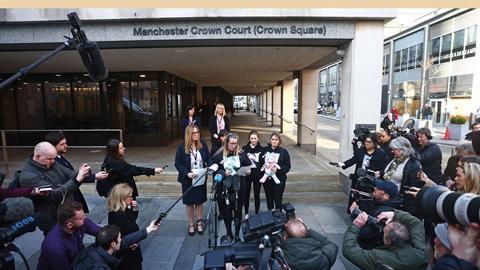Recent media coverage of Thomas Cashman’s refusal to attend sentencing for the murder of nine-year-old Olivia Pratt-Korbel has reignited the debate about whether prisoners should be compelled to attend court to hear victim impact statements and the sentencing comments by the judge. The shocking facts of the case made national headlines. Cashman, a notorious drug dealer with a history of gun violence, shot the young girl in her home in an attempted bungled hit on a rival.
After sentencing him to 42 years in prison, Mrs Justice Yip noted how ‘disrespectful’ it was for the girl’s family to read their victim impact statements to an empty dock. Cashman’s counsel, John Cooper KC, stated that his client chose not to attend the hearing as he had been made aware that prosecutors had allegedly sung Queen’s We Are The Champions following the verdict and was ‘concerned that the matter is turning into a circus’.
However, a widespread wave of public revulsion followed in the national media, with damning criticism expressed by the girl’s aunt, the chief constable of Merseyside, and the leader of the opposition. The then justice secretary Dominic Raab labelled Cashman’s decision not to appear as ‘spineless’ and indicated that a change in the law was planned ‘so victims can see the justice they deserve being served’. The precise nature of any reform remains to be seen, although there is speculation that the Victims and Prisoners Bill, currently passing through parliament, could be amended to include a provision that failure to appear without good reason could result in a harsher sentence.
Cashman’s case was not the first of its kind. In December 2022 Jordan McSweeney refused to appear for sentencing following his conviction for the murder of 35-year-old Zara Aleena in Ilford. This prompted calls for courts to be able to compel the attendance of prisoners. There have likely been many such cases that have not received the attention of the national media. Sometimes there may be good reasons why a defendant is unable to attend, and in many cases section 51 of the Criminal Justice Act 2003 provides that use of a video-link may be treated as the prisoner being ‘present’ at proceedings. Under their inherent powers, courts already have the authority to order attendance. However, as these latest high-profile cases show, even where the court has deemed it necessary, there is seemingly a reticence among prison governors to order the use of reasonable force to compel attendance. Subject to a limited number of exceptions, courts in these circumstances are empowered to pronounce sentence in absentia.
Updated guidance issued by the Crown Prosecution Service last September confirms that, where there is no good reason for a prisoner’s non-attendance, prosecutors should gather as much information as possible on the circumstances and reasons of the non-attendance. This may include, for example, whether the defendant is aware of the nature of proceedings and that the case may proceed in their absence, and whether there are any alternative means of securing attendance, including the use of reasonable force. The ultimate decision to order attendance is to be taken by the court, with prison authorities deciding what reasonable steps should be taken to secure attendance, taking into account the defendant’s conduct and behaviour.
In high-profile cases such as that of Cashman, it is difficult to identify any compelling reason that those found guilty of such heinous crimes invoking public disgust should be able to exercise a choice not to attend sentencing proceedings. As the aphorism goes, justice should not only be done, but should manifestly and undoubtedly be seen to be done. It is difficult to reconcile this with the public perception of dangerous offenders cowering in their cells, apparently indifferent to the impact of their crime upon victims or society. Certainly there would appear to be no human rights or due process concerns which would afford any form of legal justification for non-compliance or for any adverse consequences that may follow for the prisoner. However, in some cases, particularly those that are less serious or do not involve direct victims, the resources required to compel attendance through restraint and reasonable force may outweigh the desirability of attendance. Here, it may be possible that non-compliance could essentially act as an aggravating factor, resulting in a more punitive sentence.
While sentencing is rightly carried out in the name of the state (rather than the victim), policymakers have taken welcome steps in recent years to reassure victims that their voices are integral to proceedings and that they have public recognition and support. Research tells us that although preparing and delivering a victim impact statement can be an emotionally draining and incredibly difficult task, the experience of exercising their voice being heard can be empowering and therapeutic. In opting not to attend sentencing, and thereby choosing not to be held to account, offenders are able to disempower victims and obfuscate the need for justice to be seen to be done. In this sense, it is right the law and any associated guidance should be clarified to include a presumption to oblige courts and prison authorities to compel attendance.
Jonathan Doak is professor of criminal justice and associate dean for research at Nottingham Law School
































1 Reader's comment